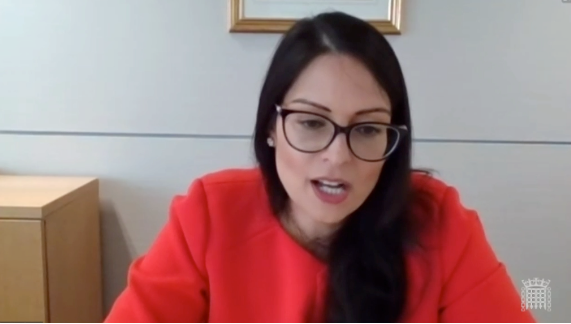Priti Patel denies ‘throwing good money after bad’ by giving France £54m to stop migrant crossings
Tory MP claims UK giving French ‘more money to carry on doing what they’re doing badly’
Home secretary Priti Patel has rejected claims that giving £54m to France to reduce the number of migrant boats reaching the UK was “throwing good money after bad”.
Ms Patel has announced the signing of the new deal with French interior minister Gerald Darmanin, which will see a doubling in the number of police patrolling French beaches and extra surveillance technology.
Defending the plan to MPs on Wednesday, the home secretary said the French authorities had increased the number of small boats intercepted in the English Channel this year.
Asking Ms Patel if the extra funding for France was “throwing good money after bad”, Tory MP Tim Loughton said: “Just giving the French more money to carry on doing what they’re doing badly is not going to solve the problem.”
Ms Patel suggested the money would boost the effectiveness of the French effort. “France are intercepting more boats that they did this time – but that is because the numbers are so high,” she told the Home Affairs Committee.
Under the newly agreed deal, French officers will patrol wider areas of coastline between Boulogne and Dunkirk and patrols will be expanded further northwest around Dieppe.
Mr Patel said that instead of the majority of migrants seeking to reach Britain coming from Calais, there was now a “widespread dispersal” of launches along “the entire French coastline”.
The number of successful migrant crossings from France to the UK has shot up in recent years. The figure for 2021 has passed at least 8,452 – surpassing the total for all of 2020.
Paul Lincoln, director general of Border Force, told the committee the number of French interceptions of small boats had “trebled” in a year from more than 2,100 by June last year to more than 6,000 for the same period this year.
Tory MPs have called on the government to push the French government to stop so many boats from leaving, as well as intercepting vessels earlier in their journeys and bringing them back to France.
Mr Loughton asked the home secretary if the French authorities were aware they are allowed under international maritime law to intercept boats and return them to France.
“They absolutely recognise that, they would argue they are doing their bit,” said Ms Patel – but she admitted they do not always interpret maritime rules to “push boats back”.
Some French patrol boats have been monitoring migrant boats to make sure they are safe until they cross into British waters. Ms Patel said: “They have a different interpretation of saving lives at sea.”
Mr Loughton accused the home secretary of being “fobbed off with excuses” by the French and allowing the French authorities to make “a mockery” of arrangements.
“Yesterday we had a French military naval vessel escorting one of the boats into British territorial waters – and then tried to hand over the occupants to a boat full of journalists,” he said.

Ms Patel also defended her plan to seek bilateral agreements which would see asylum seekers who arrive in the UK via unauthorised routes quickly returned to their country of origin.
“We’re in active discussions with EU member states on bilateral arrangements – I’ve spent a great deal of time [talking to] Netherlands, Belgium, Germany. Last night I was speaking to my French counterpart as well,” she said.
However, EU countries have expressed great reluctance about the idea of any bilateral agreements with Britain to facilitate the deportation of refugees.
In April, The Independent reported that France, Belgium and Germany do not intend to make deals with Britain on returns.
Belgium’s asylum and migration secretary, Sammy Mahdi, said then: “The UK chose to leave the EU and therefore cannot continue to count on our European solidarity. We cannot be expected simply to agree on the return of these migrants.”
Join our commenting forum
Join thought-provoking conversations, follow other Independent readers and see their replies
Comments